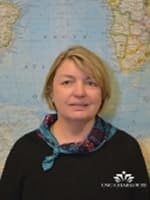
Yuliya Baldwin, a lecturer in Russian Studies in the Department of Languages and Culture Studies, recently received Quality Matters (QM) certification for her online course “LACS 3050 Understanding Russians.” It offers an analysis of Russian cultural values and communication patterns and an intercultural comparison between Russian and American culture, taught fully online.
To introduce Russian culture and to develop cultural competencies for students in the online course, Baldwin attended a series of Quality Matters workshops offered on campus beginning in 2016, and she started working to improve her course through professional consultations with instructional designers at the University’s Center for Teaching and Learning. She also had a QM internal review conducted by a UNC Charlotte QM Faculty Fellow, and eventually, she submitted the course for a QM official review.
The review committee, comprised of QM-certified peer reviewers, conducted a thorough and rigorous review of the course.
Baldwin’s course is the 19th from UNC Charlotte and the first one from the College of Liberal Arts & Sciences that has been officially certified by Quality Matters, keeping the University with the most number of QM-certified courses in the entire state, including all public and independent higher education institutions in North Carolina, according to Enoch Park, a Quality Matters/online learning specialist with the Center for Teaching and Learning.
He added Baldwin’s course is the first QM-certified online Russian culture course at the 3000 level, offered in the United States. Currently, only two institutions in the country offer QM-certified online Russian language and culture courses.
Baldwin stated that “the QM standards are changing the online education helping to create courses that incorporate best practices, are well-designed, accessible and engaging for the students.”
In addition, she noted, “The QM training and certification process helped her a lot with the pedagogy of her face-to-face courses.”